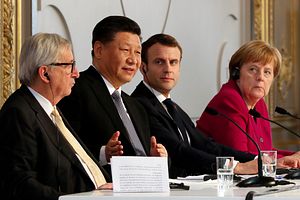As has been widely covered in the media, Italy signed on to China’s Belt and Road Initiative on Saturday, becoming the first G-7 country to do so.
The inking of the memorandum of understanding came during Chinese President Xi Jinping’s visit to Rome this week, and Italy’s government was keen to celebrate. Xi was roundly feted in the Italian capital, on par with the treatment normally granted to visiting monarchs. In return, Chinese and Italian companies signed deals worth 2.5 billion euros ($2.8 billion), including agreements for Italy’s Cassa Depositi e Prestiti (CDP) to sell “Panda” bonds and cooperate with China’s Silk Road Fund on international investments and for Italian railways and airports to boost Chinese tourism through cooperation with the online travel agency Ctrip. Most directly tied to the BRI, China Communications Construction Company (CCCC) signed agreements with Trieste and Genoa ports.
The impression left by these deals was somewhat underwhelming. The total value fell well shy of expectations, with prior reports suggesting up to 7 billion euros in deals were in the offering. Considering that China had apparently used the prospect of deals — or the threatened lack thereof — as leverage to force Italy’s hand on the BRI agreement, critics say Rome may have sold its cooperation too cheaply.
The lack of any headline agreements, other than the BRI memorandum of understanding itself, left Deputy Prime Minister Luigi Di Maio – one the strongest supporters of Italy’s China push – straining a bit for something to highlight. In the end, he was left to gush about the first shipment of oranges by air from Sicily to China, which he tried to spin as a “small revolution for our ‘Made in Italy’ products.”
Di Maio also said that the deals signed on Saturday had a potential value of 20 billion euros, but any future expansions will likely involve separate deals with their own headlines. For now, Rome is left with the 2.5 billion figure – and the controversy of its BRI inclusion. Those results are not likely to assuage different factions of the Italian government who question the wisdom of cozying up to China at the expense of relationships with the United States and the European Union.
Xi’s trip to France, following close on the heels of his Italy visit, provided a fascinating contrast to the Italian approach. French President Emmanuel Macron made a pointed show of European unity by inviting German Chancellor Angela Merkel and European Commission President Jean-Claude Juncker to join him for talks with Xi. All three signaled that they expected China’s markets to open more before they will consider joining the BRI. “We, as Europeans, want to play an active part [in the Belt and Road project],” Merkel said. “That must lead to a certain reciprocity, and we are still wrangling over that a bit.”
Macron added later, in a meeting with Xi, that China and the EU must “accelerate work… on modernizing the WTO to better respond to issues around transparency, overcapacity, state subsidies and dispute settlement.” He also pushed against China’s human rights record, promising France would continue to bring up “concerns … on the question of respecting fundamental rights in China.” Macron even referred to China’s oppression of the Muslim Uyghur ethnic group, a point of neuralgia for Beijing.
And yet, perplexingly, France’s reward for this more confrontational stance far surpassed Italy’s payment for its warm BRI embrace. France and China signed deals worth 40 billions euros during Xi’s visit – more than double even Di Maio’s hypothetical, maybe-someday top figure for the China-Italy deals. The vast majority of that value – 30 billion euros — came from a single agreement for China to purchase planes from Airbus. But even if that contract is excluded from France’s haul, that still leaves 10 billion euros in other deals – over four times Italy’s total.
The lesson from these two widely disparate visits is that embracing China is less lucrative than some might imagine – and, conversely, firm (but still diplomatic) pushback on issues of concern is less costly than some might fear. It also drives home the reality that a BRI deal is more symbol than substance, and no guarantee of major increases in Chinese investments. This is something Poland, one of the earliest European supporters of the Belt and Road, found out the hard way, after its backing failed to yield the expected boom in Chinese funds. The truth is that Chinese investments in Italy, including in ports and other infrastructure, predated Saturday’s BRI agreement – and don’t look likely to increase substantially after it.
On the flip side, none of the largest recipients of Chinese investments in Europe have joined the Belt and Road. As of 2017, according to the China Power Project at CSIS, the top European destinations for Chinese funds were Germany ($1.6 billion), the Netherlands ($1.6 billion), the United Kingdom ($1.5 billion), and France ($1.4 billion). Germany and France, in particular, have also been among the most outspoken critics of China’s trade practices and human rights records. Clearly, refraining from criticizing China isn’t necessary for winning big deals – provided your market is attractive enough.
And there’s the rub: Italy, which received just $500 million in Chinese investment in 2017, clearly hopes that signing on to the BRI will help it be more competitive in attracting Europe-bound investment. But the dirty secret of China deals is that, for all the political influence the Chinese government has over economic decisions, Chinese companies are still ultimately seeking a profit. A BRI agreement is not a panacea that suddenly makes a country’s investment climate irresistible for Chinese firms – and no piece of paper will change the fact that France is selling jet planes to China while Italy is offering oranges.

































